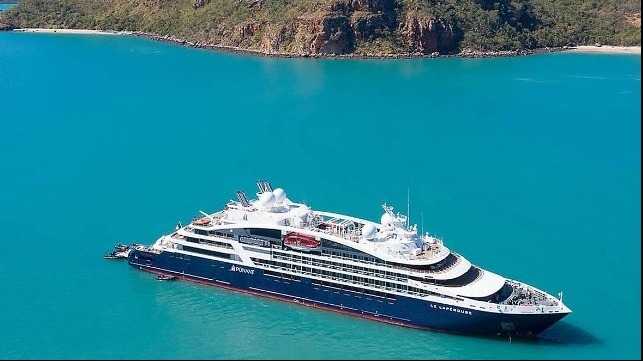Last Minute Immigration Dispute Threatens New Zealand Cruise Restart

The latest efforts to restart another cruise ship have run afoul of government regulations just days before the trips were scheduled to begin from New Zealand. A visa and immigration dispute has stranded Ponant’s cruise ship the Le Laperouse at sea, while each side is accusing the other of not following the proper protocols.
New Zealand’s Ministry of Health in December granted conditional approval to the French cruise company Ponant to restart cruises in New Zealand limited to residents. The ship, which was due to arrive in Auckland, New Zealand on February 2, was being marketed by a local New Zealand travel company that was offering expedition voyages.
Ponant had hailed the decision saying that it was the result of months of discussions with the New Zealand government. While they had hoped to also possibly cruise to Australia, they call the decision to permit the cruises to begin an important next step in the restoration of the travel industry. New Zealand was successful in largely eliminating the coronavirus in part it believes by its enforcement of strict travel and entry restrictions for foreigners seeking to travel to the country.
“When the cruise ship, Le Laperouse, was given permission by the Director General of Health, under a Maritime Border Order, to travel to New Zealand that approval was on the condition that Le Laperouse obtained the necessary visas from Immigration New Zealand (INZ). That was made clear to the ship’s agents at least twice,” said New Zealand’s Minister of Immigration Kris Faafoi at a press conference held today.
The minister said that New Zealand had received a request for border exceptions for 90 foreign crew members just 48 hours before the ship had departed Indonesia bound for New Zealand. The Ministry of Immigration granted 29 visas to crew members that it considered essential to the operation of the ship, including the officers and engineers. Visas for 61 other crew members, mostly in the hotel areas, were denied because they were deemed non-essential to the operation of the cruise ship on its voyage to New Zealand.
Minister Faafoi stressed that all of the immigration protocols must be followed and that adequate time is needed to ensure that all of the requirements are being met. Spokespersons for the cruise industry however are contending that the government wanted the cruise line to replace the crew that was deemed non-essential with New Zealanders. They said it was not possible to restaff and train a new crew in time for the scheduled trips.
Media reports from New Zealand are saying that Ponant has been told the Le Laperouse should disembark the crew members that were not granted visas before the ship arrives in New Zealand. It was suggested that the ship could disembark the crew in New Caledonia before proceeding to Auckland.
The New Zealand Cruise Association, speaking on behalf of Ponant, the charter, and the industry, issued a statement saying that it was “shocked and quite simply bewildered,” by the last minute decision. They said that five months of work and millions of dollars had been wasted and that 700 New Zealanders were unhappy that their vacations were put in jeopardy.
“The Minister of Immigration has tried to paint the decision as the fault of Ponant for not following procedure, but it is not so,” the NZCA wrote in its statement. “As soon as the exemption was granted Ponant provided information to Immigration on visa requirements for the ship’s crew, giving ample time for a response and following up with an application when they had assembled the information requested more than three weeks ago.”
The association called the decision a devastating blow saying that Ponant had done everything that was requests of it in order to start the cruises. The ship had agreed to limit capacity to 100 passengers, the crew had been isolated while the ship was slowly sailing to New Zealand, and the crew was going to undergo New Zealand Covid testing when the ship arrived.
At the moment, the Le Laperouse is reportedly circling 300 nautical miles off the coast of New Zealand hoping that an agreement can be reached before the first cruise that was due to sail on February 8.
